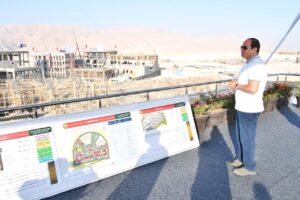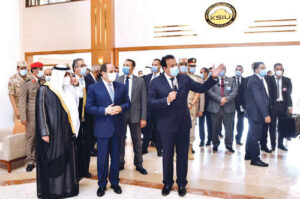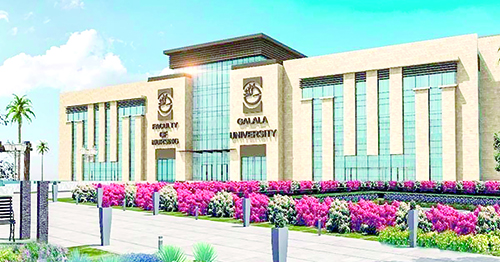Higher education and scientific research has prime attention, support and follow-up by President Abdel Fattah El Sisi, over the past seven years, 2014 to 2021, leading to unprecedented quantitative and qualitative development in the sector.

Minister of Higher Education and Scientific Research Khaled Abdel-Ghaffar yesterday reviewed a detailed report comparing the conditions of higher education and scientific research in 2014 and seven years later, shedding light on the ministry’s relentless efforts over the period, during which the sector has seen a sort of corrective revolution, according to the report.
Public universities has now hit 27, compared to 23 in 2014, a rise of 17.4 per cent, the report says. Faculties in these universities were up by 102 over the past seven years, to 494.
New study programmes in the public universities, serving the needs of the labour market and the national development process, rose to 188 compared to 118.
By the same token, private and civil universities have doubled to 36, and their faculties hit 264, compared to 132 in 2014.
Technology colleges reached 8, comprising 47 institutes.
In addition, three technological universities were established for the first time in Egypt; the University of Technology in New Cairo, the Technological University of Quesna, and the University of Technology in Beni Suef. Study started in the three universities in the academic year 2019/2020.
Egypt is planning to build six more technological universities across the country, Minister Abdel-Ghaffar said.
These include the technological universities in Samanoud, Gharbiya, New Assiut, New Taiba, 6th of October City, Burj Al Arab, and East Port Said.
Over the past seven years, four new private international universities were established: The University of Majesty King Salman bin Abdulaziz University (al-Jalala) in South Sinai with its three campuses in (Sharm El-Sheikh, El-Tor, Ras Sidr), and Al Alamein International University.

The New Mansoura International University for Science and Technology is scheduled to start studies in the next academic year.
Moreover, Egypt has four foreign universities’ branches: The Canadian Universities in Egypt, which hosts the Prince Edward Island University branch; the Knowledge International University, hosting the British branch of Coventry University; the Global Foundation, that hosts the British branch of the University of Hertfordshire; and the European Universities in Egypt (EUE), which offers world-class, transnational education, bringing together reputable international universities to create a unique hub in the Middle East and Africa region.
According to the report, Egyptian scientific research papers published on the international level reached 15,000, a rise of 107 per cent from 2014. Egypt has ranked 30th of world countries on the Scimago Journal, Country Rank, which is concerned with scientific journals, up from 34th in 2019.

Egypt has also advanced to 96th compared to 107 on the Global Innovation Index (GII) compared to seven years before, Minister Abdel-Ghaffar said.
The GII ranks world economies according to their innovation capabilities. Consisting of roughly 80 indicators, grouped into innovation inputs and outputs, the GII aims to capture the multi-dimensional facets of innovation.
Egypt has performed better in innovation outputs than innovation inputs in 2020. This year, Egypt ranks 104th in innovation inputs, higher than last year and higher compared to 2018.
Egypt also ranked 53rd in the research and development sub-index of the Global Innovation Index.
Meanwhile, the budget of the Ministry of Higher Education and Scientific Research has increased to LE65 billion, instead of LE25 billion, a rise of roughly LE40 billion, or 160 per cent.

Work is underway to complete the national project to upgrade the efficiency of the universities ‘information infrastructure in line with the state policy on transformation’, Minister Abdel-Ghaffar said.
Egypt has established eight technological parks in co-operation with the Ministry of Communications and Information Technology in the universities of Menoufia, Mansoura, Sohag, Aswan, Minya, Qena, South Valley, and the Suez Canal.
This step came within the framework of the country’s strategy for entrenching and disseminating the culture of creativity and innovation nationwide, encouraging development and digital economy.
University hospitals have risen to 115, compared to 27 in 2014, the report said.
Up to three million students have come to receive higher education services, 700,000 more than in 2014, in addition to 430.000 in postgraduate studies.
Over the past years, the ministry of higher education has concluded contracts to implement 582 research projects covering energy, water, health, communications, agriculture, modern technologies, environment and strategic industries, with a total funding of LE195 million.
The ministry has also carried out more than 95 per cent of applied research projects conducted on solar concentrators and seawater desalination, with a grant of 7.5 million euros, in addition to building a solar-powered mobile water desalination plant in Borg El Arab and Shalateen cities, the report said.
Referring to the fight of the pandemic, the report said that the ministry has had a leading role in researches on Covid-19.
Egypt ranked first in Africa and the Middle East region and ninth on the world level in the number of researches (around 57 researches) on the pandemic.
The ministry has clinched a number of agreements with some of the world’s highly prestigious universities, including a partnership agreement between the Faculty of Engineering, Ain Shams University and that of the British East London University. It signed with a view to granting dual degrees from both universities in architecture programmes, building engineering, and software systems.
A co-operation agreement was signed between the Electronics Research Institute and the Shanghai Institute of Micro-Systems and Information Technology for designing co-operation mechanisms in the field of clean room construction and technology transfer consultations.
The ministry has also concluded a protocol with the American Ocean University to establish community colleges, within the framework of developing technical education.






Discussion about this post